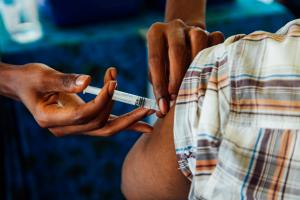From below 10 to 51 percent - Tanzania increases COVID-19 Vaccination Coverage
Tanzania- As COVID-19 vaccine delivery enters a phase of integration with routine services, Tanzania has emerged the best performing among 34 African countries for concerted support by the COVID-19 Vaccine Delivery Partnership. From a poor coverage of 2.8% of the total population by mid-January 2022, Tanzania recorded an exponential increase to 51% as at April 2023.
Because of the dramatic achievement, Tanzania has become the best performer among 34 countries that were below 10 percent of target population by January 2022. WHO, UNICEF and Gavi, the Vaccine Alliance launched the COVID-19 Vaccine Delivery Partnership (CoVDP) in January 2022 to advocate for the urgency in turning vaccine doses into vaccinated, protected communities that had low performance. The CoVDP, supported the countries overcome bottlenecks to vaccination.
Continuous political buy-in, cross-sectoral collaboration and involvement of implementing partners to expand reach and services beyond immunization teams and enable targeted approach towards priority groups are identified as enablers of Tanzania’s exponential increase during the period under review.
WHO Representative for Tanzania, Dr. Zabulon Yoti stated that “the rapid increase in COVID-19 vaccination is a consequence of heightened political commitment at the national, regional and district levels.” At a technical meeting, coordinated and facilitated by WHO in May 2022 in Dodoma, capital of Tanzania, the government and partners leveraged on the national leadership’s positive stance to develop and endorse a rapid plan of action for accelerated vaccination campaign.
Dr. Yoti affirmed that leveraging on the national leadership has renewed commitment as WHO facilitated partners mapping and provided technical guidelines on the adoption and implementation of region-specific mass vaccination campaigns according to comparative advantages of partners/NGOs to accelerate vaccination coverage that engendered healthy competition to increase coverage at the regions.
 Hence, implementing partners including WHO, UNICEF, USAID, FHI, CDC and others adopted specific regions for special technical and financial support to increase vaccine uptake. Dr. Yoti further explained other strategies that contributed to the sustained increase in COVID-19 vaccination. “In addition to the healthy competition introduced by the adoption of regions by partners, a socio-ecological approach to hesitancy enabled a positive environment for acceptance of COVID-19 vaccines. As well, service delivery through house-to-house strategy made COVID-19 vaccines readily available at zero cost, acceptable and affordable to beneficiaries.”
Hence, implementing partners including WHO, UNICEF, USAID, FHI, CDC and others adopted specific regions for special technical and financial support to increase vaccine uptake. Dr. Yoti further explained other strategies that contributed to the sustained increase in COVID-19 vaccination. “In addition to the healthy competition introduced by the adoption of regions by partners, a socio-ecological approach to hesitancy enabled a positive environment for acceptance of COVID-19 vaccines. As well, service delivery through house-to-house strategy made COVID-19 vaccines readily available at zero cost, acceptable and affordable to beneficiaries.”
As of the February 2023, a total of 32,093,549 people have been fully vaccinated in the United Republic of Tanzania which translates to about 45% of the total population and 87% of the target population above 18 years. More than 38,900,000 vaccine doses have been received in the mainland and Zanzibar through bilateral agreement and the COVAX facility and a total of more than 90% doses have been distributed to regions.
Since the beginning of 2022, available data show a sustained reduction in the number of hospital admissions due to COVID-19. “A downward trend in COVID-19 related hospitalization, can be plotted on the curve of increase in access to vaccination in Tanzania,” observed Yoti.
In June 2022, Tanzania was one of 11 countries selected through the Global Vaccine Access (Global VAX) initiative, the U.S. government’s partnership with Tanzania raised awareness about the importance of getting vaccinated, and amplified investment in expanding COVID-19 vaccine delivery efforts including cold chain and supply logistics, vaccine confidence and demand, data and analytics, local vaccination plans, and more. The initiative boosted demand for the vaccines were more than 70% of it eligible population were fully vaccinated by December 2022.
“CDC focused on vaccinating people at highest risk for getting sick due to COVID-19, including people with HIV, staff in healthcare facilities, and community workers. Sometimes addressing the barrier to vaccination was as simple as having a sign that says ‘COVID-19 vaccines here.” CDC Tanzania Country Director, Mahesh Swaminathan explained.
The first case of COVID-19 in Tanzania was registered on 16th March 2020. Since then, the outbreak has subsequently evolved and affected, to varying magnitudes, all the 31 regions in the United Republic of Tanzania. The mainland, which accounts for 98% of cases and 96% of deaths reported cumulatively in Tanzania, has experienced four waves of the outbreak so far and has reported a sustained decline in cases and deaths in the last one year.
Communications and Media Officer
WHO Country Office, United Republic of Tanzania
Tel:+255 22 2111718/2113005
Mobile:+255 743 958599
Email: mwijarubim [at] who.int
Email: onuekwec [at] who.int
Tel: +234 803 402 0832
